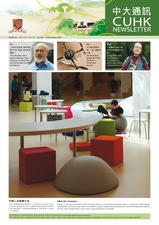- CUHK Faculty of Social Science Dean’s List 2010–11
- Chartis Hong Kong Scholarships 2010–11
- Sir Edward Youde Memorial Fellowships for Disabled Students 2010–11, 2011–12
- I‧CARE Programme’s Best Research Award 2012
You were admitted to CUHK with outstanding A-Level results, and received several academic awards in a couple of years. How do you keep up your passion for learning?
When I was little, I was already very interested in studying. It brought me knowledge, and I made many friends during the course of learning. To be honest, I couldn’t take part in rigorous sport, like running, which requires a high level of mobility. To concentrate on studying seemed the most suitable task for me. Although I have a disability, there are things I can still do. I’m grateful that I can continue my studies at a university; it gives meaning to my life. It doesn’t matter if I write slowly, and sometimes I can’t concentrate in class because of feeling tired. What matters most is that I’ve got this opportunity. I need to cherish my years as an undergraduate student, and this is what gets me going. Of course, I feel happy if I get good results. Nobody would think the contrary. I’ll try to do my best academically. But when I feel exhausted, I won’t push myself too hard.
CUHK appealed to you even a long time ago. Can you tell us about that?
I love its liberal atmosphere and its environment. From my first to my last priorities on the JUPAS application form, I had listed only CUHK programmes. Normally, no student would do that because it means doors to the other universities will be closed to you. But it was my dream to become a CUHK student. In 2008, after I sat for the HKCEE examinations, I joined the CUHK Summer Institute and took biotechnology and social science modules. It was a delightful experience. On one occasion when I met my secondary school teachers and classmates after entering CUHK, they told me they could sense that I was as joyous as before, but there was something more—confidence. I told them I had just had a busy day and was feeling tired, but they said that they could tell from the expression on my face that I was really enjoying my life here.
Why do you find psychology fascinating?
In psychology, there is a stream focusing on the transition of people with disabilities during their different life stages, and how one can cope with them. My research interest is on people who are physically disabled, e.g., patients like me suffering from muscular dystrophy, etc. My health condition will degenerate progressively, so how do I cope with it? I know many scholars worldwide are studying this topic; I wonder how many of them are handicapped. I have at least first-hand experience to count on. Besides, I need to face other challenges when growing up, to transit from an ordinary adolescent to a more mature adult. I hope I can devote more time to research in this area and eradicate discriminations that physically disabled people encounter.
How do you feel about the press coverage about you being admitted to CUHK?
In some media reports, they tend to describe me as an extraordinary person. In fact, I am just an ordinary student. It’s my wish to share my experience with more people. Many people ask, ‘Do you feel tired in class?’ I’ll say, ‘When the class is scheduled for 8:30 am, everyone feels sleepy, not only me.’ That’s true. My back aches when I sit for too long. That’s also true. In my sharing, I want to bring out one message—I don’t mind disclosing details about my disability, and I hope others understand that I am really nothing special. I am just like anyone else.
What are your other interests?
I like books on biotechnology very much. I also like architecture because I always want to know more about barrier-free access design. In my leisure, I write blog posts for the Muscular Dystrophy Association’s website in the US. Some of my friends are curious and ask why I have so many diverse interests, and query the place of psychology to me. I think that’s OK. One of the merits of coming to university is you are able to meet people with different expertise and explore various disciplines and be inspired. If possible, I also want to join exchange programmes and participate in student committees.
CUHK was built on a hilly terrain. Do you find its facilities for people with disabilities adequate for the wheelchair bound?
I live in a student hostel and I ride on the rehabus to classes. The driver is very attentive and friendly. Sometimes, I’ll go uphill or downhill in my power wheelchair. The CUHK campus is carefully designed and there are ramps between short distances so that we can get on and off the pavement easily. The facilities of classrooms, libraries and hostels are fairly good.
Gloria Ma’s blog.



































































































































































Social Bookmarks